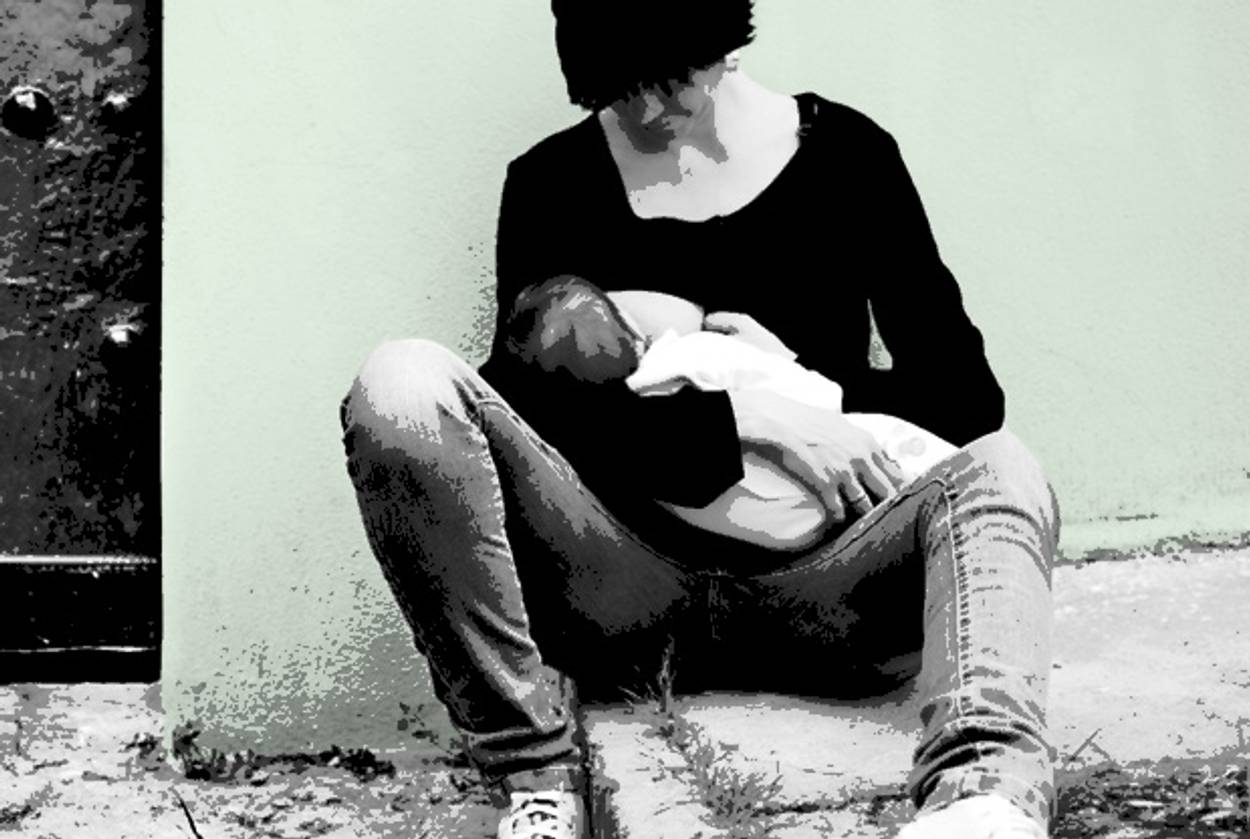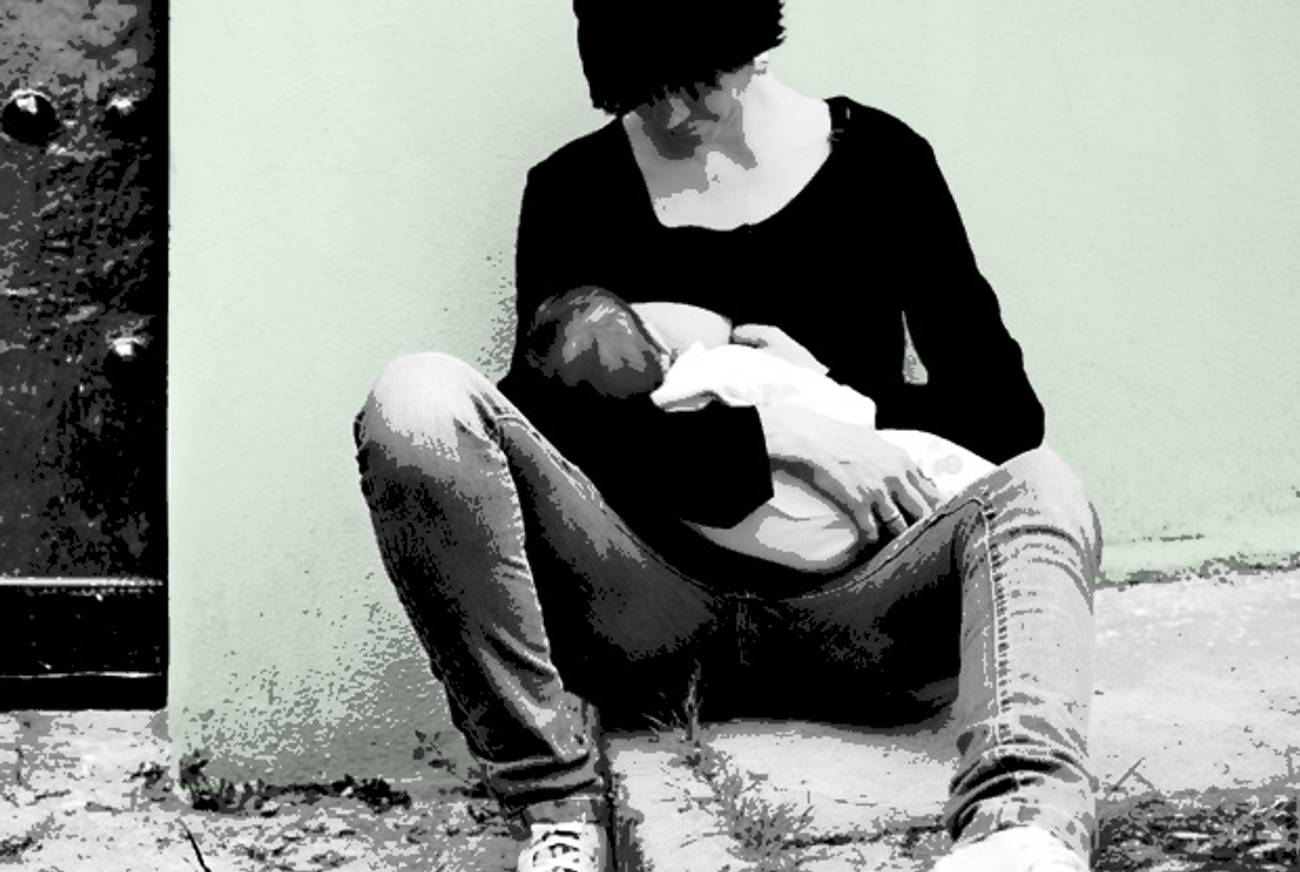Selling Sex to Nursing Moms
Breastfeeding mothers have enough to think about without worrying that they’re not sufficiently sexy




A New Jersey mom agreed to make an educational video about breastfeeding two years ago. Last week, that mom filed suit against the video’s producers—the Meredith Corporation, publisher of Parents magazine, which I’ve written for—after parts of her educational video ended up on porn sites.
Of course, feeding a baby is not pornography. But it’s hardly surprising that some folks view normal mammalian mothering as something highly sexual, considering that we live in a culture in which anything related to breastfeeding is sold with a shimmy and a come-hither gaze, soft-focus lighting and the language of seduction. Just look at how breastfeeding is portrayed in advertising that aimed at the mothers themselves; of course people (particularly those who, um, aren’t equipped to breastfeed) equate it with sex.
There are maternity and nursing lingerie lines called HOTMilk, Milkalicious, Whoa Momma, MommyLicious, and PassionSpice. (Warning: Some of those links may be NSFW, because nursing is sooooo naughty!) The manufacturers of sexy nursing wear claim to be all about women’s empowerment, but they’re really about selling sex. And not the I-own-my-own-sexuality kind of sex; the I-am-an-object-see-me-giftwrapped kind of sex. A lacy teddy or filmy polyester gown isn’t going to make life easier for nursing women; only better health care and family leave policies will do that. (Here’s something else that won’t help: Latch On NYC, New York City Mayor Bloomberg’s recently announced plan for hospitals to lock up formula like contraband as a way to help women breastfeed, which won’t make life easier for breastfeeding women and will make life more challenging for women who can’t or don’t want to breastfeed for personal or economic reasons.)
When the language and visuals of breastfeeding products aren’t sexy, they’re sniggeringly cutesy. In the last few days, I’ve gotten press releases for nursing products called Milkies and Bamboobies. The nudge-nudge-wink-wink language is similar to the tone of breast-cancer awareness campaigns aimed at young women: “Save 2nd Base,” “Save the Ta-Tas,” “Feel Your Boobies”—campaigns that don’t improve the lives of women with breast cancer in any meaningful way but do not-so-incidentally trivialize breast cancer and disenfranchise women who aren’t interested in being hotties. (Most women, I’d bet, aren’t so interested in being hotties while undergoing radiation and chemo treatment. Women shouldn’t feel bad for not feeling foxy while nursing an infant, either. Sense a pattern here?) Like the breast cancer campaigns, nursing products today are sold with a certain coyness that masks a lot of anxiety.
Nursing mothers are entitled to tune out commercial culture that pushes them to be sexy all the time. It’s OK to take a hotness time-out. “When you’re a nursing mother, you need that island of time,” said Sarah Chana Radcliffe, a Canadian psychologist, Orthodox Jew, and author of Raise Your Kids Without Raising Your Voice. “You need to be connecting to the baby, fully; you don’t need to be split down the middle, being sexy and feeding your child, at that exact moment. Breastfeeding isn’t a sexual act; it’s an intimate act with the baby. It’s love of a different kind. And turning it into an opportunity to sell sexuality is almost as though someone’s intruding on your private moment, diminishing it. A woman has to be respected and honored as a person, not just as a body.”
The conflict may indeed be particularly resonant for us Jews. We’re more likely to breastfeed than other groups, since white and highly educated women are the most likely to nurse, and we’re disproportionately represented among that group. “Breastfeeding is of value within our community,” Radcliffe said. “In a culture that’s fragmented and not supportive of mothering, it can be difficult. But I see very strong family support that still goes on in the Jewish community that’s not always there in the larger community.”
Historically and religiously, Judaism has always valued nursing. A 2006 study by the former head of the Shaare Zedek Medical Center pediatric department in Israel published in the journal Breastfeeding Medicine found that Orthodox women tend to breastfeed longer than average. The author, Arthur Eidelman, pointed out that religious women may be influenced by the amount of support expressed in the Talmud for nursing. He adds that the Talmud recommends breastfeeding for two years (and helpfully points out that breast milk is pareve and kosher, even though it comes from a non-kosher animal—that is, us human ladies).
Orthodox women tend not to breastfeed in mixed company; those who do are careful to cover up with blankets and drapes. (Perhaps they’d appreciate another unnecessary product’s press release I got recently, for the Covillow, which combines a breastfeeding pillow and a poncho into one bulky, diaper-bag-space-consuming package!) For them, breastfeeding is still covered by the laws of tzniut, or modesty. But even with a drape or a blanket, very religious women may find nursing embarrassing and isolating. One Haredi mom blogged movingly about her revelation that she didn’t have to nurse while hiding in corners. “Anna T” wrote: “It had been months since I’ve been to synagogue because I didn’t feel comfortable nursing in the (mostly nearly empty) women’s section…I just went outside, crouched somewhere in a tiny spot of shade and nursed. The baby and I were stiflingly hot and I was crying because I felt so suffocated by always having to miss out on conversations and family celebrations. I felt as though I had spent the best part of the last months hidden away.” But seeing another mother nursing publicly in the dining hall inspired her to come out. She resolved that in the future, she’d be less ashamed.
I, on the other hand, am of the hippie school of Jew that has always believed that breastfeeding is not inherently immodest; those who see the act of feeding a baby as provocative need to get over themselves. (I’m talking to you, woman in the Friendly’s off I-95 in Connecticut who yelled at me to go nurse Maxine in the bathroom and tried to get the waitress to kick me out of the restaurant when I wouldn’t budge.) Nevertheless, you don’t have to be religiously observant to have mixed feelings about nursing. If you’re working and pumping, you may feel guilty for “shirking” at the office while also feeling sad about not being home with your baby. If you’re home and nursing full-time, you may feel anxious about not contributing financially to your family and nervous about your ability to rejoin the work force later. (And of course, if you’re not nursing at all, or having trouble nursing, well, there’s plenty you can feel miserable about on those fronts, too.)
The one additional pressure you don’t need when your baby is tiny is to feel presentational and self-objectification-y. Your hormones are doing a hora, you’re exhausted, you’re adjusting to the notion that a tiny person is utterly dependent on you and you may never have clean hair or go to the movies ever again. (Eventually you will. And then you’ll find entirely new things to worry about.) But it’s OK not to multitask for while. It’s OK to accept that you will not look like naked pregnant Demi Moore on the cover of Vanity Fair. (Fine, that was a vintage reference. But look what happened to Demi Moore. She wasted the best years of her life with that skanky cheating Ashton Kutcher, so you might as well wear sweats and stay on the couch. I forget what point I was making here.) If strappy corsets and G-strings make you feel good, then rock out with your knockers out. If you prefer to nurse in a ratty oversized concert T-shirt from 1997, then that’s fine, too. Neither choice makes you more or less of a mother. (And not nursing at all, for whatever reason, does not invalidate you, either.) If products with twee names appeal to you and you want a (shudder) Hooter Hider to nurse under, amen to you. Just don’t be embarrassed to do what is legally protected in 44 states. And most of all, bear in mind that anyone trying to sell you anything—lingerie, formula, or ironic Frankie Says Relax repro T-shirts—is primarily motivated by selling, not your emotional welfare.
***
Like this article? Sign up for our Daily Digest to get Tablet Magazine’s new content in your inbox each morning.
Marjorie Ingall is a columnist for Tablet Magazine, and author of Mamaleh Knows Best: What Jewish Mothers Do to Raise Successful, Creative, Empathetic, Independent Children.
Marjorie Ingall is a former columnist for Tablet, the author of Mamaleh Knows Best, and a frequent contributor to the New York Times Book Review.